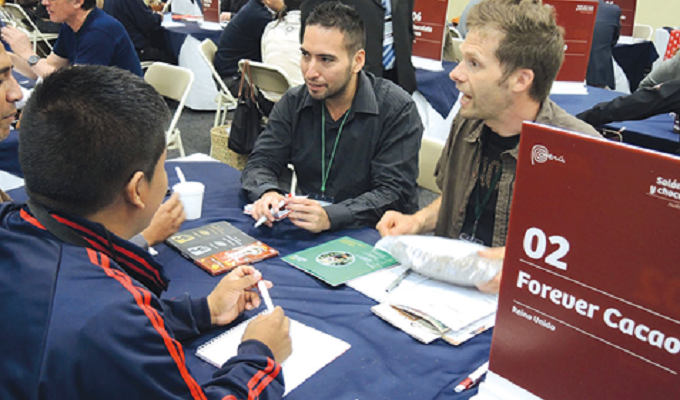

Harnessing cocoa trade to improve livelihoods, protect biodiversity in Peru
The conservation of rich but fragile ecosystems often relies on giving local communities an incentive to protect biodiversity rather than to unsustainably exploit resources. The Peruvian Amazon is one of the world’s most diverse ecosystems. Communities in the region depend on natural resources for consumption and to generate income. Yet unsustainable use, leading to biodiversity loss, can threaten livelihoods, compounding the impacts of climate change.
Cocoa – particularly the top-quality ‘ fine or flavour’ varieties prized in international luxury chocolate markets for their unique taste – offers a path to better livelihoods and the preservation of endemic biodiversity. Many of these ne or avour cocoa beans – as distinct from ‘ordinary’ or ‘bulk’ varieties – are native to the Amazon region. But Peruvian smallholder farmers and SMEs producing native cocoa and its derivatives often cannot reap the rewards of higher prices and incomes because they struggle to differentiate and position their product in the highly competitive international market. The obstacles they must overcome include a lack of market information, weak business connections, and insufficient capacity to comply with market requirements such as sustainability certification.
Limited access to lucrative niche international markets hurts the livelihoods of the smallholders who dominate cocoa cultivation in Peru. It also encourages the cultivation of lower-value, non-endemic cocoa varieties, which come with a bigger environmental footprint and risks to local biodiversity. Estimates suggest that cocoa production involves around 45,000 households, directly affecting the lives of around 225,000 people in Peru’s Amazon region.
Enhancing incentives to protect biodiversity by connecting local communities to international markets for sustainably grown and harvested biodiversity-based products is a central plank of ITC’s work. Since 2014, ITC has enabled Peruvian SMEs and smallholder farmers producing fine or flavour cocoa to improve product sustainability, quality and traceability, while facilitating direct connections to buyers in lucrative niche markets.
The project operates on multiple fronts. It provides technical assistance to cocoa-producing cooperatives and SMEs to enable them to identify and showcase their fine or flavour varieties. In tandem with this, it helps them improve product quality, meet international safety (Hazard Analysis Critical Control Point) and sustainability (such as organic or fair trade) standards, and bolster their branding and marketing. At the countrywide level, ITC worked to strengthen the national cocoa taster network to serve as an independent quality control body and a mechanism for transmitting best practices to cultivators and businesses. Finally, SMEs from the Peruvian Amazon are being supported to participate in national and international trade fairs with the aim of forging connections with new buyers of chocolate and other cocoa products
Two years into the project’s implementation, awareness
in the region about the bene ts of sustainable business practices in the fine or flavour cocoa sector has substantially increased. Capacity building to bring harvest and post-harvest treatment practices in line with international quality and sanitary standards has been delivered to cocoa-producing cooperatives representing around 1,800 smallholder farmers. Cooperatives and SMEs have received technical support to diversify their product basket to include chocolate, cocoa nibs, and couverture,
a high-value product rich in cocoa butter used by chocolate- makers for dipping and coating. They have also been trained in improved branding, marketing and sustainable packaging.
Coupled with quality improvements and standards compliance, participation in national and international trade fairs has yielded substantial dividends. The Peruvian SMEs that participated in trade fairs thanks to ITC support registered sales of US$1.68 million for products ranging from cocoa beans and nibs to cocoa butter and chocolate.
In 2015, ITC helped bring the prestigious International Chocolate Awards to Peru, marking the rst time the event had been held in a cocoa-producing nation. International chocolatiers were invited to serve as judges for the awards, thus expanding their exposure to Peruvian cocoa products. ITC also worked with the Peruvian Association of Cocoa Producers (APPCACAO) to help cooperatives participate
in the competition.
Together with the APPCACAO; the Ministry of Agriculture; Promperú, Peru’s trade promotion agency; and the Latin American Development Bank (CAF), ITC has reinforced the national cocoa taster network to equip it to spread best practices on quality control and upgrading for native varieties of Peruvian cocoa. In the cocoa supply chain, tasters are key quality control points: they assess both cocoa beans and the intermediate products of post-harvest processing, and are well positioned to suggest improvements. Prior to the project, however, Peru’s cocoa taster network did not offer capacity building to cooperatives. It will now act as the national reference point for cocoa quality control, offering training in the country’s main cocoa-producing regions.
In 2016, together with Promperú and other local trade support and investment institutions, ITC will continue its technical assistance programme for cocoa cooperatives and SMEs in Peru.
ITC is planning to replicate efforts to promote sustainably sourced cocoa and cocoa products in other fine or flavour cocoa-producing countries in the region, such as Ecuador and Colombia.



